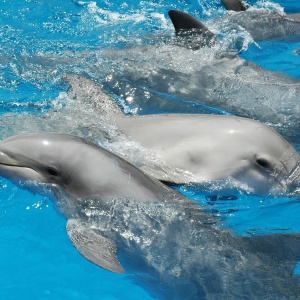
A study has found that people who view vegetarianism as a threat to their way of life, and those who believe in human supremacy over animals, are likely to have fewer animal species that they view as worthy of moral consideration (compared to people who do not see vegetarianism as a threat or who do not believe in human supremacy over animals). Moral attitudes varied strongly towards different animal species, for example, 90% of participants a felt moral obligation to care for the welfare of dogs, compared to 51% who felt the same obligation for pigs.
Study participants who viewed vegetarianism as a threat were not only less likely to feel moral obligation towards “food animals”, but also were less likely to feel moral obligation towards charismatic wild animals such as dolphins, bears, chimpanzees and kangaroos. The study authors hypothesise that the latter effect could be because these appealing wild animals are often used in conservation marketing campaigns, and that environmentalism can also be viewed as a threat to people’s way of life.
Abstract
Stronger beliefs in human supremacy over animals, and stronger perceived threat posed by vegetarianism to traditional practices, are associated with stronger speciesism and more meat consumption. Both variables might also be implicated in the moral exclusion of animals. We tested this potential in a 16‐month longitudinal study in the USA (N = 219). Human supremacy showed longitudinal effects on the moral exclusion of all animals. Vegetarianism threat only predicted moral exclusion of food animals (e.g., cows and pigs), and, unexpectedly, appealing wild animals (e.g., chimps and dolphins). These findings demonstrate the importance of both human supremacy and perceived threat in explaining moral exclusion of animals and highlight potential paradoxical negative consequences of the rise of vegetarianism.
Reference
Leite, A.C., Dhont, K. and Hodson, G., 2018. Longitudinal effects of human supremacy beliefs and vegetarianism threat on moral exclusion (vs. inclusion) of animals. European Journal of Social Psychology. Early view.
Read the full paper here. See also the Foodsource building block What is animal welfare?







Post a new comment »